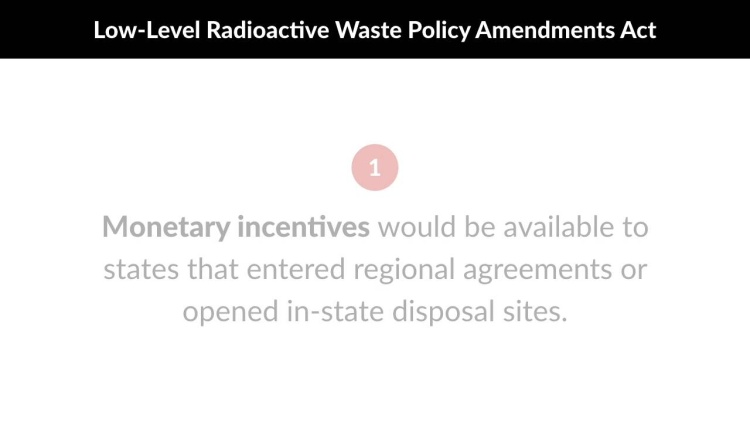New York v. United States
United States Supreme Court
505 U.S. 144, 112 S.Ct. 2408, 120 L.Ed.2d. 120 (1992)1057
- Written by Megan Petersen, JD
Facts
In 1985, Congress enacted the Low-Level Radioactive Waste Policy Amendments Act (the act) to help address issues of low-level radioactive-waste disposal among the states. The act encouraged states to adopt programs to dispose of their own waste by creating three incentives: a monetary incentive to encourage states to open waste sites, an access incentive to allow states without sites to be denied access to other states’ sites, and a take-title provision that required a state, upon request of a waste generator within its borders, to take title to the waste and pay damages to the generator for any harm caused by the state’s failure to take title. The State of New York (plaintiff) brought suit against the United States government (defendant), alleging that the three provisions of the act were unconstitutional under the Tenth and Eleventh Amendments, the Due Process Clause, and the Guarantee Clause. The federal district court dismissed the complaint, and the court of appeals affirmed. The United States Supreme Court granted certiorari.
Rule of Law
Issue
Holding and Reasoning (O’Connor, J.)
Concurrence/Dissent (Stevens, J.)
Concurrence/Dissent (White, J.)
What to do next…
Here's why 905,000 law students have relied on our case briefs:
- Written by law professors and practitioners, not other law students. 47,100 briefs, keyed to 995 casebooks. Top-notch customer support.
- The right amount of information, includes the facts, issues, rule of law, holding and reasoning, and any concurrences and dissents.
- Access in your classes, works on your mobile and tablet. Massive library of related video lessons and high quality multiple-choice questions.
- Easy to use, uniform format for every case brief. Written in plain English, not in legalese. Our briefs summarize and simplify; they don’t just repeat the court’s language.





